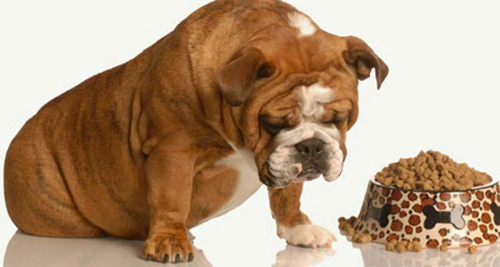Puppy food as well as a balanced diet is the foundation of puppy health. However, some of the health problems below suggest that your dog may be affected by daily food.

1. Obesity – The most common disease in dogs
Obesity is considered a nationwide epidemic for pet dogs, affecting the majority of family pets. Worse still, dogs affected by obesity are prone to arthritis, diabetes, high blood pressure, and cancer. According to the Association for the Prevention of Pet Obesity (APOP), reduced life expectancy has also been linked to obesity in pets, and unfortunately, in all pets that veterinarians classify as obese. enlarged. More than 90% of initial dog owners thought their dog's weight was normal and within an acceptable range.
You need to pay special attention to the calories and fat in puppy food. While both are important to the diet, excess can cause or worsen a dog's obesity. Likewise, finding an appropriate diet that restricts calories and fat can help your dog lose weight and, over time, lead your dog to a healthier lifestyle.
Choose the ideal diet for your pet by consulting with your veterinarian for the best advice for your dog.

2. Pancreatitis
Pancreatitis develops when the pancreas becomes inflamed, diverting the flow of digestive enzymes to the abdomen. If this happens, digestive enzymes will begin to break down fats and proteins in other organs as well as in the pancreas. In dogs, a high-fat diet known to be associated with the development of pancreatitis can stimulate the secretion of a hormone that causes the pancreas to secrete its digestive hormones. You can consult your veterinarian to see if the amount of fat in your dog's current diet could increase your dog's risk of pancreatitis. If your dog has pancreatitis, you need to feed him meals that are low in fat and easy to digest.

3. Bladder stones
Each stone is not the same size. They may include different minerals or other substances. For example, calcium oxalate bladder stones are mainly composed of calcium while bladder stones are mainly composed of magnesium and phosphate (phosphorus). Bladder stones are small at first, but over time can grow in number and size, causing problems like urinary tract accidents, urine discoloration, and difficulty urinating.
If you suspect your dog has bladder stones, talk to your vet right away. They can determine the type of bladder stone and recommend a food to dissolve the stone or surgically remove it if it is one that cannot be dissolved with food, such as calcium oxalate stones. Your vet will also recommend a special diet to help prevent bladder stone formation.
Even if your puppy does not have bladder stones, they should still be offered a diet low in calcium and phosphorus. Your veterinarian will know the best dog food in the current situation.
Heart disease
Dogs often have the same heart problems as we do, especially if their diet isn't right. A major factor in heart disease in dogs is their sodium intake. Increased sodium in the diet is one of the causes of increased sodium circulating in the blood by high blood pressure. As blood pressure rises, the heart must continue to expand to overcome the increased pressure to pump blood from the ventricles.
Are you feeding your dog the leftovers on the dinner table? Is your dog food too high in sodium? Talk to your veterinarian about these things so that your dog can be properly fed to ensure good health!

4. Diarrhea
Dogs often have intermittent diarrhea, but there are two main types: small bowel diarrhea and large bowel diarrhea. Dogs with small bowel diarrhea often pass large amounts of soft stools and only a few times a day. When abnormalities occur in the colon, dogs often secrete small amounts of loose stools frequently throughout the day. This is large bowel diarrhea.
For diarrhea in the large intestine, a high-fiber diet is very beneficial for dogs. Ideally, this should include both soluble (the type of food that colon bacteria use) and insoluble (indigestion). For small bowel diarrhea, you should feed your dog a light and low-fat diet to benefit the digestive process.
Finally, discuss with your veterinarian the role fat, fiber, calcium, phosphorus, and other nutrients play in your puppy's health. Your veterinarian can recommend an important new nutritional regimen regarding your puppy food so that your puppy will always have a healthy and happy life.

 Van Phuc, Ho Chi Minh, Viet Nam
Van Phuc, Ho Chi Minh, Viet Nam
 (0274) 377 66 11
(0274) 377 66 11
 ada@adabiotechvn.com
ada@adabiotechvn.com
 adabiotechvn.com
adabiotechvn.com